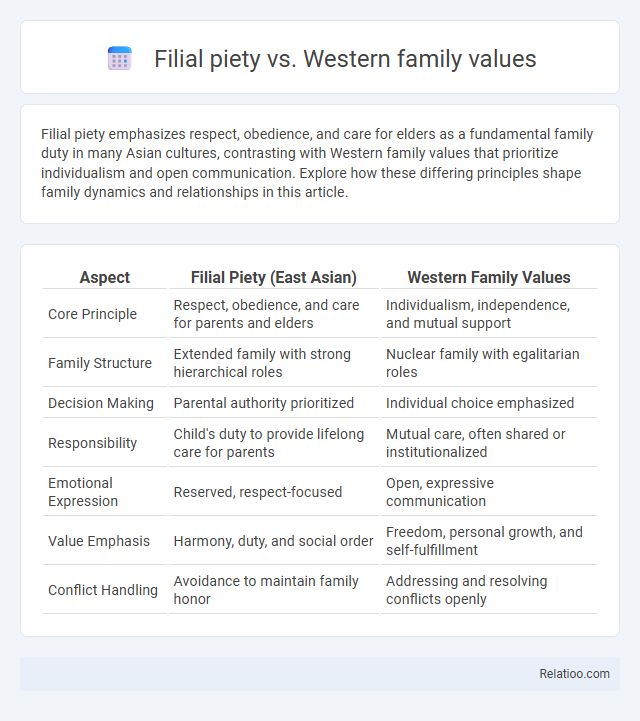Filial piety emphasizes respect, obedience, and care for elders as a fundamental family duty in many Asian cultures, contrasting with Western family values that prioritize individualism and open communication. Explore how these differing principles shape family dynamics and relationships in this article.
Table of Comparison
| Aspect | Filial Piety (East Asian) | Western Family Values |
|---|---|---|
| Core Principle | Respect, obedience, and care for parents and elders | Individualism, independence, and mutual support |
| Family Structure | Extended family with strong hierarchical roles | Nuclear family with egalitarian roles |
| Decision Making | Parental authority prioritized | Individual choice emphasized |
| Responsibility | Child's duty to provide lifelong care for parents | Mutual care, often shared or institutionalized |
| Emotional Expression | Reserved, respect-focused | Open, expressive communication |
| Value Emphasis | Harmony, duty, and social order | Freedom, personal growth, and self-fulfillment |
| Conflict Handling | Avoidance to maintain family honor | Addressing and resolving conflicts openly |
Understanding Filial Piety: Roots and Meaning
Filial piety, deeply rooted in Confucian philosophy, emphasizes respect, obedience, and care for one's parents and ancestors as fundamental family responsibilities, reflecting a collective cultural mindset prevailing in many East Asian societies. Western family values tend to prioritize individual autonomy and self-expression, often highlighting mutual support and emotional bonds rather than hierarchical duties. Understanding filial piety requires recognizing its role in shaping intergenerational relationships, social harmony, and moral conduct within traditional Asian contexts, contrasting with Western perspectives that focus more on personal freedom and nuclear family dynamics.
The Foundations of Western Family Values
The foundations of Western family values emphasize individual autonomy, mutual respect, and emotional support among family members, contrasting with the Confucian principle of filial piety that prioritizes hierarchical obedience and duty to elders. Your understanding of Western family dynamics reveals a focus on nurturing independence while valuing strong emotional bonds and reciprocal care. This approach fosters open communication and equality within familial relationships, differing markedly from the traditional expectations embedded in filial piety.
Historical Influences on Family Roles
Historical influences on family roles reveal significant contrasts between filial piety and Western family values, with filial piety emphasizing respect and obligation toward parents rooted in Confucian traditions, shaping multigenerational households and hierarchical family structures. Western family values often prioritize individualism and nuclear family independence, influenced by Enlightenment ideals and industrialization, leading to more egalitarian and fluid family roles. Understanding these differences helps you appreciate how cultural legacies shape expectations and responsibilities within families worldwide.
Obligations: Duty vs. Independence
Filial piety in many Asian cultures emphasizes a strong obligation of duty and respect toward parents and elders, prioritizing family harmony and intergenerational support. Western family values often highlight individual independence and personal freedom, encouraging self-reliance and autonomous decision-making. The contrast between these paradigms reveals a cultural divide where filial piety stresses collective responsibility, whereas Western traditions prioritize personal autonomy within familial relationships.
Parent-Child Relationships: Contrasts and Commonalities
Filial piety emphasizes unwavering respect, obedience, and care for parents, deeply rooted in Confucian traditions, fostering a collectivist family dynamic. Western family values often prioritize individualism and open communication, encouraging children to express independence while maintaining familial support. Both systems highlight the importance of parent-child bonds, yet they diverge in balancing authority and autonomy within family relationships.
Care for the Elderly: Tradition vs. Modernity
Filial piety, a core value in many Asian cultures, emphasizes respect and care for the elderly as a lifelong responsibility, often involving multigenerational households and direct caregiving. Western family values tend to prioritize individual independence and professional care services, reflecting a modern approach where elderly care is frequently managed through healthcare systems or assisted living facilities. Your understanding of elderly care can be enriched by comparing these traditions, recognizing how cultural expectations shape both family dynamics and support structures.
Cultural Expectations and Social Pressure
Filial piety in many Asian cultures emphasizes unwavering respect, obedience, and care for elders, driven by deeply ingrained cultural expectations and social pressure to uphold family honor. Western family values tend to prioritize individualism and personal autonomy, encouraging open communication and self-expression while balancing responsibilities to parents and relatives. Your experience navigating these differing cultural frameworks can influence how social obligations and familial respect shape interpersonal dynamics and emotional well-being.
Conflict and Harmony: Navigating Generational Gaps
Filial piety in Eastern cultures emphasizes respect and duty toward parents, often prioritizing family harmony and elder care, while Western family values focus more on individualism and personal freedom, sometimes leading to conflicts across generations. Navigating these generational gaps requires understanding the cultural roots behind each value system and finding compromises that honor both familial obligations and personal autonomy. Your ability to balance respect for tradition with modern independence shapes the harmony or tension within diverse family dynamics.
The Impact of Globalization on Family Norms
Globalization has reshaped family norms by blending traditional filial piety, emphasizing respect and care for elders in Asian cultures, with Western values that prioritize independence and nuclear family structures. The cross-cultural exchange fosters a dynamic tension where younger generations balance collective obligations with personal autonomy. This convergence influences caregiving practices, intergenerational communication, and family hierarchies worldwide.
Bridging the Divide: Towards Mutual Understanding
Filial piety, deeply rooted in Confucian ethics, emphasizes unwavering respect and duty toward parents and ancestors, contrasting with Western family values that prioritize individualism and personal autonomy within family dynamics. Bridging the divide between these perspectives requires fostering cross-cultural dialogue that highlights shared goals of familial support and care, while respecting distinct traditions and social expectations. Mutual understanding emerges through integrating filial obligations with Western ideals of independence, creating hybrid family models that honor both collective responsibility and personal freedom.

Infographic: Filial piety vs Western family values
 relatioo.com
relatioo.com